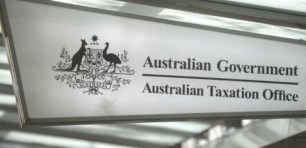
ATO commissioner of taxation Chris Jordan. Source: AAP/Lukas Coch.
Australia’s shadow economy and small businesses are on the Australian Taxation Office’s (ATO’s) radar, as the federal government attempts to bridge the gap by putting tax dodgers on notice over billions in unpaid taxes.
According to the Commissioner of Taxation annual report, released this week, the undisputed tax debt has increased from $26.5 billion on June 30, 2019, to $44.8 billion as of June 30, 2022.
In his review of the report, commissioner Chris Jordan said addressing the tax debt increase is a priority.
“As the economy recovers, one of our key priorities is to address the collectable debt that has accrued over the past three years,” he said.
According to the report, the increased debt is attributed to “disrupted economic activity due to lockdowns and cash flow impacts on small businesses and households”.
The commissioner met with Assistant Treasurer Stephen Jones on Monday where they announced an estimated $33.4 billion tax gap between tax owed and tax paid.
Jordan told the The Australian Financial Review that small business taxpayers and work-related expenses are the biggest contributors to the gap.
“The biggest effect of COVID-19 is in our collectable debt increasing,” he said.
“Most of that is small business, self-declared debt. It’s not tax on profits… it’s unpaid superannuation guarantee, it’s the GST that’s been collected and never remitted.
“It’s the withholding from wages pay as you go that has never been remitted.”
The ATO has re-commenced its usual debt collection activities for small businesses this year, after pausing enforcement actions during the height of the pandemic. This has prompted tax professionals to warn small businesses to stay on top of their tax obligations and to speak up early if they need help.
In last week’s federal budget, the government revealed plans to reclaim at least $5.7 billion of the debt by beefing up the resources of tax regulators, including by spending $242.9 million to extend the ATO’s Shadow Economy Program for a further three years and $80.3 million to extend the ATO’s Personal Income Taxation Compliance Program for a further two years.
Jones said cheating on taxes impacts funding for the most essential of Australia’s services.
“The vast majority of taxpayers do the right thing but cheating on your taxes is not a victimless crime,” the Assistant Treasurer said.
“It directly impacts funding for vital services from equipping our defence force personnel to caring for our aged.
“The Albanese government’s investment in tax integrity will make the system fairer and bring in $5.7 billion in legally‑owed revenue to benefit the whole community.”
The federal government also announced in its 2022-23 federal budget last month that it will invest $1.1 billion to increase and extend funding for the ATO’s Tax Avoidance Taskforce.
The taskforce will also be extended by another 12 months until July 2025.
Since June 2021, the Tax Avoidance Taskforce has helped the ATO raise $22.9 billion in tax liabilities. The government uses this revenue to fund essential services, including education, health and other community services.
The ATO annual report confirms a gross tax of $648.5 billion was collected in 2021 to 2022 and $132.9 billion of refunds were provided. Net tax collections stood at $515.6 billion, which was up $64.2 billion from 2020 to 2021.
Improving small business tax performance will continue as a key focus area in 2022 to 2023, according to the report.
Handpicked for you

Insolvency rates are returning to pre-COVID levels as extraordinary tax office leniency comes to an end



COMMENTS
SmartCompany is committed to hosting lively discussions. Help us keep the conversation useful, interesting and welcoming. We aim to publish comments quickly in the interest of promoting robust conversation, but we’re a small team and we deploy filters to protect against legal risk. Occasionally your comment may be held up while it is being reviewed, but we’re working as fast as we can to keep the conversation rolling.
The SmartCompany comment section is members-only content. Please subscribe to leave a comment.
The SmartCompany comment section is members-only content. Please login to leave a comment.